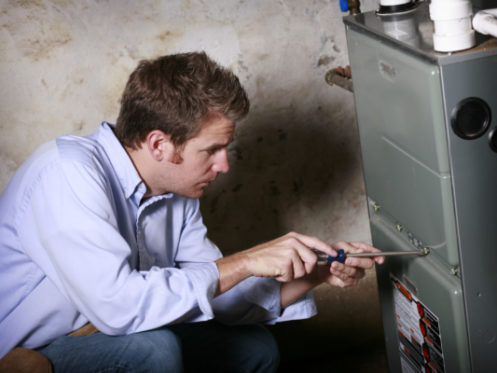There are countless homes here in Mishawaka, IN, that rely on gas or oil-powered furnaces for heat. That’s because furnaces are efficient, easy to maintain, and relatively inexpensive. However, a furnace can develop operational issues that call for expert intervention to resolve. For example, it’s occasionally necessary to bleed your furnace to keep it running as it should.
What Does Bleeding a Furnace Mean?
Furnaces rely on the combustion process to burn fuel and produce heat. The combustion process only works when there’s an uninterrupted fuel flow to a furnace’s burner. For various reasons, air bubbles can end up in your fuel line. When they do, they interrupt the fuel flow to the burner and the combustion process.
In an oil-powered furnace, homeowners often let their fuel supply drop too low or run out entirely. When that happens, the furnace will begin to pull air through its fuel lines from the empty tank. Then, when the tank gets refilled, that air stays in the fuel lines, leading to the need for a furnace bleed.
In a gas-powered furnace, there’s no fuel tank to worry about. However, your home’s gas supplier might inadvertently allow air into their supply lines. When that air reaches your furnace, it can cause the same problems an oil-powered furnace experiences. Bleeding a gas furnace isn’t needed often, but when it is, you’ll want a professional handling the job.
How a Technician Bleeds an Oil-powered Furnace
Oil-powered furnaces are most likely to need bleeding from time to time. When your furnace needs it, an HVAC technician will follow specific steps to ensure all of the air is out of the fuel line. Then, they’ll restart your furnace and check that it’s back to working as it should.
The first step the technician will take is to turn off your furnace. Then, they’ll locate your furnace’s bleed screw on its fuel pump near the incoming fuel line. They’ll then place a bucket under the bleed screw and loosen the screw.
With the bleed screw loosened, the technician will turn your furnace back on to activate the fuel pump. Then, they’ll wait until the fuel running out of the bleed screw flows smoothly. That’s how they’ll know there’s no air in the fuel line. At that point, the technician will tighten the bleed screw and check that your furnace is operating normally.
How a Technician Bleeds a Gas-powered Furnace
Although it’s not necessary very often, gas-powered furnaces may also need bleeding now and then. When they do, the process is similar to how it’s done on an oil-powered furnace. The main difference is that the technician will need to first open up nearby windows and doors to ventilate the area around your furnace.
Then, if your furnace’s gas supply line has a built-in bleeder valve, the technician will open it to release trapped air from the line. If not, they’ll instead use a gas line purge kit. It includes a bleeder valve the technician can attach to your gas line and a pressure gauge they can use to monitor the bleeding process.
Once the technician finishes bleeding your natural gas line, they’ll wait to be sure that any natural gas that escaped into the air ventilates away from your furnace. They’ll also remove the bleeder valve if your system doesn’t have one built-in. Then, they’ll restart the furnace and check that it’s working as it should.
Leave Furnace Bleeding to the Experts
As you can tell, bleeding your furnace isn’t something you’d want to do yourself. Fuel oil and natural gas are dangerous to handle, and there is some risk involved. Fortunately, you never have to bleed your furnace yourself. Instead, you can call on our team of expert HVAC technicians here at Tyler’s Heating & Cooling. We’ve served the Mishawaka, IN area with pride since 2017 and are a family owned and operated HVAC service company.
Contact the Professionals
We offer a complete range of residential and commercial heating and cooling services, including installation, repair, and maintenance. Plus, we have an A+ rating with the Better Business Bureau, so you know that you can count on us for excellent service and support.
So, contact Tyler’s Heating & Cooling the next time your furnace needs bleeding, and we’ll take care of it in no time!

